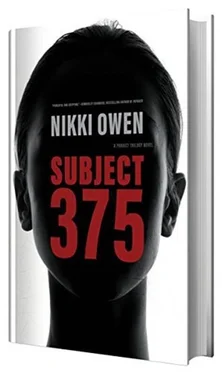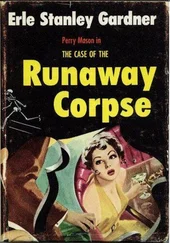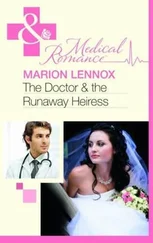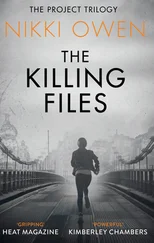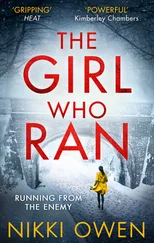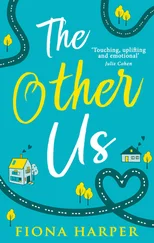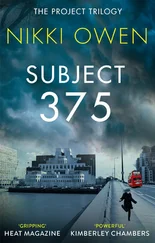‘Maria,’ Kurt says now, soft, low, ‘you have to remember you were convicted of killing Father O’Donnell-a guilty verdict, prison. And I think the repercussions of the prison environment, for you, may be adding to your sense of…your sense of anxiety, perhaps, your confusion. Prison is a hard place to be. You have been through a lot already.’
‘But you know I am innocent,’ I say. ‘You know what happened in the…in the…’ I stop, a slap of reality hitting me hard. Innocent. Not guilty. The two terms suddenly seem alien, odd, two strangers in the street. I don’t know what I believe any more, what I am capable of. ‘They put Michaela in Goldmouth to keep an eye on me,’ I say now. ‘They put her in there to ensure I said nothing over Father Reznik, about what-who-he really was.’
‘And what is he?’
I hesitate. ‘A retired intelligence officer.’
Kurt shakes his head. ‘Maria, can you hear what you are saying? MI5? A Catholic priest a former intelligence officer? How can all that be? And besides-’ he pinches the bridge of his nose ‘-retired implies no longer active, no longer working.’
‘You don’t believe me?’
He inhales, taps his pen. ‘I believe that you believe it. I believe that you have been through a very traumatic process for someone like you. It is common for people in your position to…fabricate stories. To merge fact with fiction to create your own storyboard. It could be a way of the brain protecting itself from reality.’
He thinks I am making it up. My eyes dart left and right around the room, at my hands, my legs, my feet. ‘This is not fiction,’ I say, quietly. ‘It is the truth.’
But he says nothing. Instead, I simply hear the click of his pen as he writes some notes. I rub my eyes. I cannot handle this, cannot cope with the feelings coursing through me.
The scent of paint is in my nostrils now. It is too much. Standing, I trail my fingers along my bag strap and walk to the window. I stop, hoist it up, longing for air, for a mouthful of freedom. Sunshine blasts in through the bars and hits my face. I inhale. I miss Salamanca. Sometimes I find myself thinking of my childhood home in Spain. Papa with the newspaper on his lap, oranges and lemons fat and ripe in the groves beyond. My brother, Ramon, and I running, shouting. Brown limbs. My calculator in my pocket. My brother crying when I broke his arm by accident. Papa negotiating a settlement between us. Always the lawyer. Mama cradling her Ramon, screaming at me to fetch the doctor, then apologising later for her anger, an anger that I never fully understood.
‘Maria, I would like you to sit down now.’
I turn. Kurt is clutching a cup of coffee. I do not recall it being delivered. I return to my seat. Kurt taps his Dictaphone.
‘We’ll explore your compromised memory later. But for now, tell me what happened when you were taken to the infirmary, following the incident with Michaela Croft. You came across a newspaper article…Is that correct?’
‘Yes,’ I reply. Kurt smiles like the sun. I press my lips together. Thinking about my barrister, about what he did to help me-it is hard. ‘The article concerned a QC in London,’ I say finally. ‘He’d recently won an appeal case. The appeal was thought to be futile, yet he was successful in overturning the original verdict.’
My throat is dry. I reach for the coffee.
‘And this QC,’ Kurt says, ‘did you think he might be useful for an appeal?’
I sip. ‘Yes.’
‘And he contested the original DNA evidence, didn’t he?’
‘Yes, but-’ I see something. Up there. Another cobweb on the ceiling. I clutch the cup tight. Kurt mentioned a compromised memory. Is that what I am experiencing? Is that what his therapy is uncovering, following the trauma? And so is the cobweb just part of my imagination?
‘The QC’s name was Harry Warren. Correct?’
The cobweb. It looks like the lace headdress my mother would often wear to church for mass or to visit Father Reznik.
‘Maria? Did you hear me?’
‘Pardon? Oh, I wrote it down,’ I say, focusing again. I place my cup on the table and slip my notebook from my bag. ‘It is all in here.’
He eyes the writing pad, his gaze probing the cover. ‘Could you read it, please?’
I open the page, scan the codes, algorithms, procedures, muddled memories, dreams, until I reach the correct date entry. It takes all my concentration not to check if the cobwebs are real.
I am in the hospital wing hooked up to an IV drip.
There is bandaging on my torso. I have three broken ribs, two lacerations to my right arm and one to my left. My eyes are bruised and my nose is swollen. CT scans have been done: no bleeding on the brain; my right cheekbone is chipped; my knuckles are scraped. I feel drained, worn out, no energy left in me, no fight, no strength.
Michaela was in segregation, and now she is in solitary. Following a brief disciplinary hearing, she will remain there for two weeks. Her punishment. Governor Ochoa informed me himself. Twice he has visited me, sitting, watching. I do not know why. He does not say much, just blinks. Not a lot you can say to someone who drifts in and out of morphine-induced sleep. They have tried to quiz me about the beating, about what Michaela did, but events are hazy, a blur of words and images, nothing concrete, nothing I can grasp on to. She must have hit my head harder than I thought.
I reach out, pick up a newspaper. Pain shoots down my arm. I flop back and exhale. The hospital wing is bright and rest is impossible, so I have taken to reading periodicals. They keep me alert. Yesterday, my legal counsel again refused to support my application for appeal and while I pleaded with them, while I begged them to help me, still they refused. Despite the Governor saying he would help, I do not know what I am going to do. I do not know anyone in this country. I have no friends here, no life. The appeal application deadline is fast approaching.
It is on page five of The Times that I see it. An article. A QC has secured a famous chef his freedom after he was found guilty of murdering his sous chef. New evidence. Following a lengthy trial, the conviction was overturned.
Overturned. I scan for the QC’s name.
Harry Warren.
Could this be it? My new counsel? Could he help me? There is a photograph of him next to the article. I study it: black skin, wide smile, round stomach. Good-looking, once. A man of money and paid help.
Metal clatters to my right. I glance up. A bedpan has been knocked to the floor.
I return my eyes to The Times and look closer. The man looks familiar, yet how can that be? To the right of the page there is a short biography. It says he is married, two grown-up children: twins. His wife is a solicitor. They are both fifty-eight, both charitable figures. But all that to me is irrelevant, because, to arrange an appointment with him, what I really want is right there, at the bottom.
His office: Brior’s Gate Chambers.
Which means Mr Warren works here. In London.
Five days in the hospital wing and now I am out.
The guard links my arm like a crutch as I hobble to my cell. Inmates stare and whisper. No one comes near me, a leper, a marked woman, strange, weird. I hold my head up as much as I can as I shuffle forward, but inside I am lonely, sad, completely desolate.
I enter the cell to find that I have a new cellmate. Her name, the guard says, is Patricia. She is moving around the cell now as I sit on my bed and touch the Bible, the new hiding place for my notebook, tucked behind the cover. Thankfully, prison is not a place where people read scripture. There’s no room for God here.
‘Hello?’
This new person is standing before me. Her hair is shorn, fuzzy against her scalp like the blood-soaked fluff of a newborn chick.
Читать дальше
Конец ознакомительного отрывка
Купить книгу
